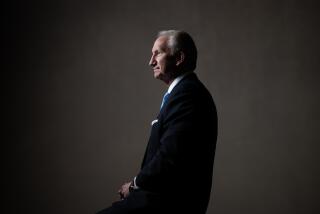Tisch Seeks Public’s Stamp of Approval : Postmaster General Tries to Polish Image
Around Loews Corp., Preston R. (Bob) Tisch was regarded as Mr. Outside--the guy who flew around the country dealing with customers while his brother, Laurence A. Tisch, tended to such things as budgets and organization charts at the New York conglomerate they controlled.
In some ways, things haven’t changed all that much for Bob Tisch, who became postmaster general last August. He was in Los Angeles last week, smoothing relations with several large U.S. Postal Service customers and meeting with the news media in his new role as an ambassador of sorts for the Postal Service.
V. Paul Vaughan, whose Hoovan Business Mail Co., a direct mail service, handles 40 million pieces of mail yearly, said he was impressed with Tisch. “He just walked up and said, ‘Hi, I’m Bob Tisch.’ Another postmaster would say, ‘Hello, I’m General Tisch.’ ”
Vaughan says he has been co-chairman of the Los Angeles Postal Customers Council for 10 years but until now had never met “one-on-one with a postmaster general.”
Tisch came to the Postal Service from Loews, which has interests in insurance, hotels and tobacco. Loews also holds a 25% stake in CBS Inc., and his brother Laurence now runs CBS. As postmaster general, Tisch--one of America’s richest men with a personal fortune estimated at $950 million by Forbes magazine--earns $88,800 yearly at the Postal Service.
Tisch took charge of the Postal Service at a time when its image needed some help. It was tarnished by an equipment purchasing scandal that involved Peter A. Voss, a member of the Postal Service’s board of governors. Voss pleaded guilty last May to a charge that he received $20,000 in illegal payments for his efforts to help a Dallas company sell the Postal Service equipment needed to read nine-digit ZIP codes.
The Postal Service’s purchasing procedures are being revised as a result of three in-house investigations that resulted from the scandal, Tisch says. A fourth inquiry, this one by the General Accounting Office, isn’t yet completed, he says. “I think those problems are behind us now,” Tisch says.
Tisch says his move from industry to government hasn’t changed his management approach. He believes in giving managers who have proven themselves enough autonomy to do their jobs. So far, most of his high-level appointments have gone to career Postal Service employees. “No one knows how to deliver the mail better than the people who do it,” he says.
Tisch says he is implementing a decentralization program developed by his predecessor, Albert V. Casey, that gives local managers greater autonomy. One result of that change is that in Los Angeles, post offices open earlier and close later.
Tisch has made other moves to strengthen the Postal Service’s marketing, especially in the area of Express Mail.
Hurt by Competition
The overnight delivery service declined 8.7% for the year that ended on Sept. 30, due to competition from private carriers, such as Federal Express and Purolator Courier.
The Postal Service is experimenting with accepting credit cards for Express Mail payments in some places and has installed thousands of special mail boxes for Express Mail in business districts around the nation--300 in Los Angeles alone--to make it easier for business to use the service.
“We stemmed the decline (in Express Mail) over the last six months. . . . We expect to end up with 15% of the market,” says Tisch. The Postal Service now handles about 10% of overnight letters and parcels.
In another area, the news wasn’t so rosy. Tisch says that a postal rate hike is likely in 1988 because the Postal Service faces a $1.4-billion increase in employee benefit payments as a result of federal legislation. The price of a first-class stamp was last increased by two cents to 22 cents in 1985.
More to Read
Inside the business of entertainment
The Wide Shot brings you news, analysis and insights on everything from streaming wars to production — and what it all means for the future.
You may occasionally receive promotional content from the Los Angeles Times.










